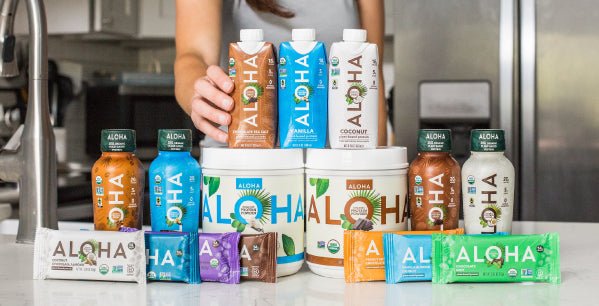Do you ever go to the grocery store and just feel overwhelmed? All the bright packaging and bold lettering trying to catch your attention. Faint music playing as you attempt to navigate around bulky displays and fellow customers whose ankles are just inches in front of your cart. Throw in nutrition labels and phrases like “fat free” and “light”, “all natural” and “naturally derived”, it can make shopping for healthier food items feel like a fool's errand.
Instead, you should feel empowered when you grocery shop. Take pride in the fact that you ultimately have the power to choose the foods you put into you body, whether it be because the food better meets your health needs or simply because it tastes good. We have the opportunity to make these decisions everyday and the better informed we are, the easier it can be to make those decisions.
Let’s explore a few of the most common terms you’ll see on packaging and what they actually are telling you.
Fat-Free, Low-Fat, Reduced Fat

Views on fat have been, and most likely always will be, controversial. After the release of U.S. Low-Fat Diet Recommendations in the late 70’s, a major shift towards removing fat from foods occurred. Grocery store shelves were bombarded with products claiming to be “reduced fat” or “fat free” and saturated fat in particular took a beating.
But is all fat really bad? To say there is a solid consensus on this would be a lie, but at its core, fat has some really important roles in the body. Take for example the fat-soluble vitamins, vitamin A,D,E, and K. These four major vitamins all require fat to be properly absorbed by the body. Fat is also an important source of energy for our brain, which is actually made up of a significant proportion of fat. Not to mention, fat tends to be a longer lasting source of energy. The benefits are numerous.
Rather than focusing on items that are fat-free or lower in fat, focus on what tastes good to you and if anything, look at the specific types of fat. Look to incorporate foods made with healthier fats like olive oil or avocado oil, which contain unsaturated fats. Be a little more wary of foods made with hydrogenated vegetable oils or trans-fats which have been linked to inflammation and elevated cholesterol. This is where the ingredient list may come in handy.
Natural, Naturally-derived
You might be asking yourself, “shouldn’t all foods be natural?” Sadly, no. Many foods now can be made in a factory or lab, take a meatless “meat” patty for example. While these foods may have started out from something natural, they are far from it by the time they reach our plates. Terms like naturally-derived or naturally-made can be indicative of these types of food items.
A more telling term would be naturally-occurring. This tells us that the item comes from nature and is unaltered. Again, the ingredient list may be helpful here. Does the ingredient list fill the back of the packaging label or are there only a few ingredients listed? Fewer ingredients suggest less adulteration. Products that call out containing nothing artificial should also be a beacon as you strive to make health conscious choices.
Sugar-free, No added sugar
Sugar, like fat, is another controversial subject. But unlike fat, there seems to be a bit more research pointing at the negative health effects of consuming excess amounts of sugar. To best identify foods high in sugar we need to understand the difference between foods with naturally-occurring sugars and those with added sugars.
Take blueberries for example. A handful of blueberries is relatively high in sugar but all of that sugar is naturally occurring -- the blueberries are naturally sweet without having to have any sugar added. Fruits are an excellent example of foods that contain no added sugar.
Grab a blueberry yogurt and the story is a bit different. While the dairy itself has naturally occurring sugar (called lactose), the majority of the sweetness is likely coming from an additional source like cane sugar or corn syrup. And just because a label says sugar-free, doesn’t mean it’s free from sugar-substitutes like erythritol or aspartame. These sugar alternatives are artificial sweeteners that contain fewer calories than real sugar.
Bottom line, sugar in excess amounts does not do us any good. Strive to eat foods that have naturally-occurring sugars and foods with a minimal amount of added sugar.
Organic, Non-GMO

Organic and Non-GMO are two terms that often get mixed up. While they both are indications of how a food was grown or made, they mean two different things.
Genetically modified organisms (GMO’s) are used to modify a food, usually to make a food or product more desirable, like making an apple bigger or taste sweeter. Non-GMO indicates that a product has not been genetically modified -- basically, the natural chemical structure of the food or product has not been altered or engineered.
When it comes to the term organic, organic means that the food or product was grown or made without any chemicals, pesticides, GMO’s or other man-made additives. In terms of organic meat products, animals must be kept in living conditions that are similar to their natural environment and are fed 100% organic feed. Both organic and non-GMO products must meet specific requirements to be fully certified and able to display the corresponding symbols on their packaging.
Ultimately...
We know it can seem like a lot, but at the end of the day, it’s all about the journey and embracing each opportunity to make healthier decisions. The next time you’re at the grocery store, recognize those labels as friends rather than foes. Don’t let a pretty label fool you into buying something you don’t actually want or need.









